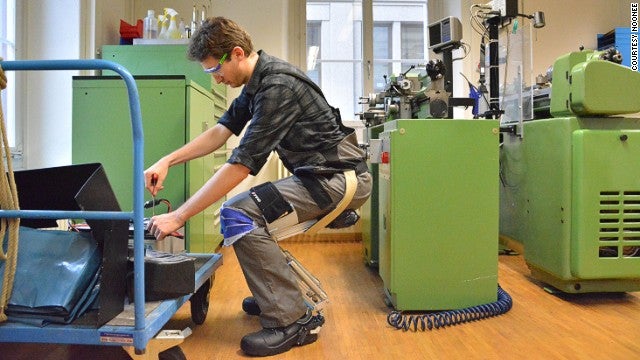Wearable chair allows workers to sit anywhere - and could save millions in healthcare bills
The device is aimed at helping workers in factories suffering from musculoskeletal disorders, with Audi and BMW reportedly interested
.jpg)
Your support helps us to tell the story
From reproductive rights to climate change to Big Tech, The Independent is on the ground when the story is developing. Whether it's investigating the financials of Elon Musk's pro-Trump PAC or producing our latest documentary, 'The A Word', which shines a light on the American women fighting for reproductive rights, we know how important it is to parse out the facts from the messaging.
At such a critical moment in US history, we need reporters on the ground. Your donation allows us to keep sending journalists to speak to both sides of the story.
The Independent is trusted by Americans across the entire political spectrum. And unlike many other quality news outlets, we choose not to lock Americans out of our reporting and analysis with paywalls. We believe quality journalism should be available to everyone, paid for by those who can afford it.
Your support makes all the difference.It's still a while before powered exoskeletons become common among factory workers (although closer than you think) but a new, simpler mechanical enhancement might make life that little bit easier for workers on their feet all day: a wearable chair.
Invented by Zurich-based start-up noonee, the Chairless Chair looks like a pair of prosthetic limbs strapped behind the wearer's own. It’s secured by belts around the hips and thighs and as soon as the wearer sits down it locks into place, providing relief for aching legs.
Nooone say that the device could be sold to average consumers one day (you’d never have to worry about finding a seat on the tube) but at the moment are targeting industrial workforces around the world.

In Europe, musculoskeletal disorders (MSDs) caused by physical strain affect some 40 million workers, accounting for nearly half (49 per cent) of absences from work and 60 per cent of permanent work incapacity.
This is damaging to both employees and employer, with Fit for Work Europe estimating that “poor health due to muscle and joint pains represents an estimated cost to society in Europe of up to €240 billion” (£192bn).
The chair does have some limitations though. Although it weighs only 2kg thanks to an aluminium and carbon fibre frame, it needs power to lock into position and runs out of juice in around 24 hours. Let’s just hope that people remember to charge it before attempting to sit down - or it might lead to an increase in workplace injuries.
Join our commenting forum
Join thought-provoking conversations, follow other Independent readers and see their replies
Comments